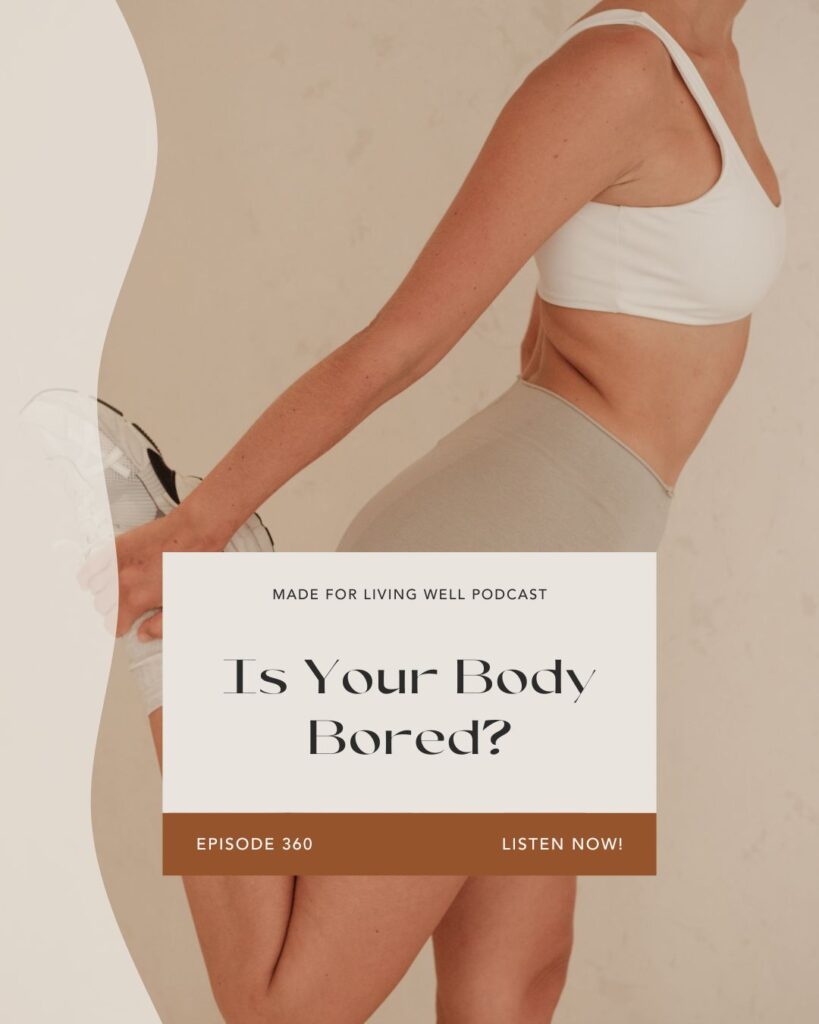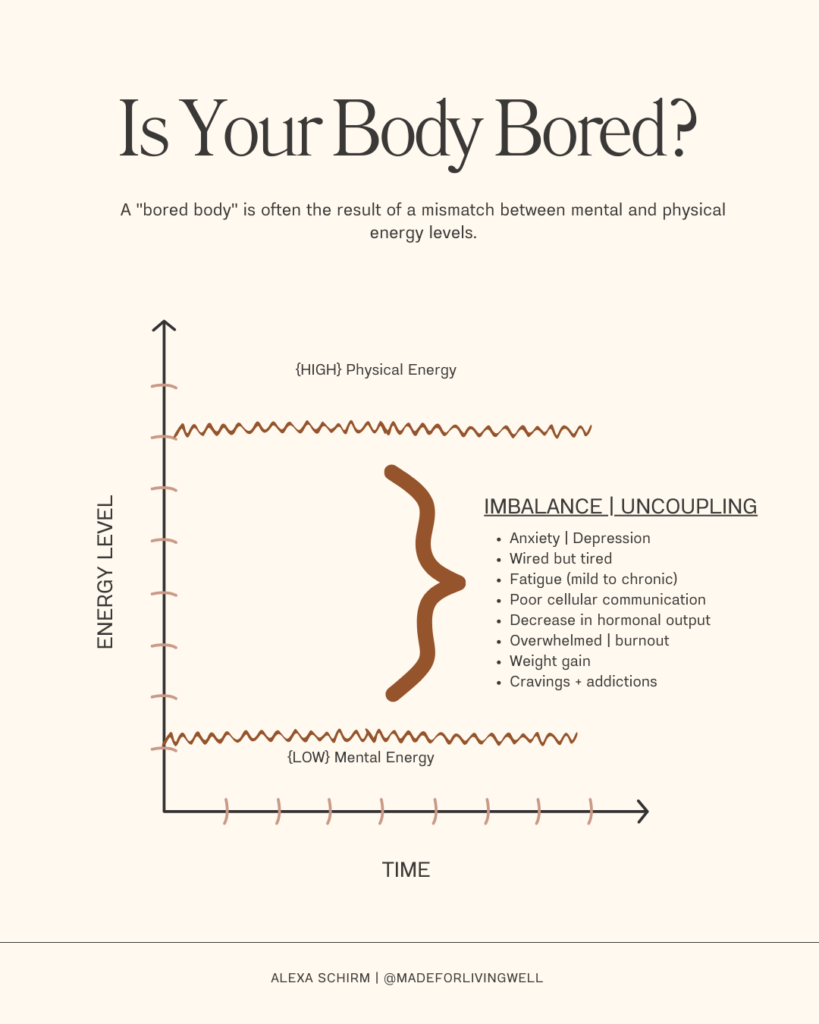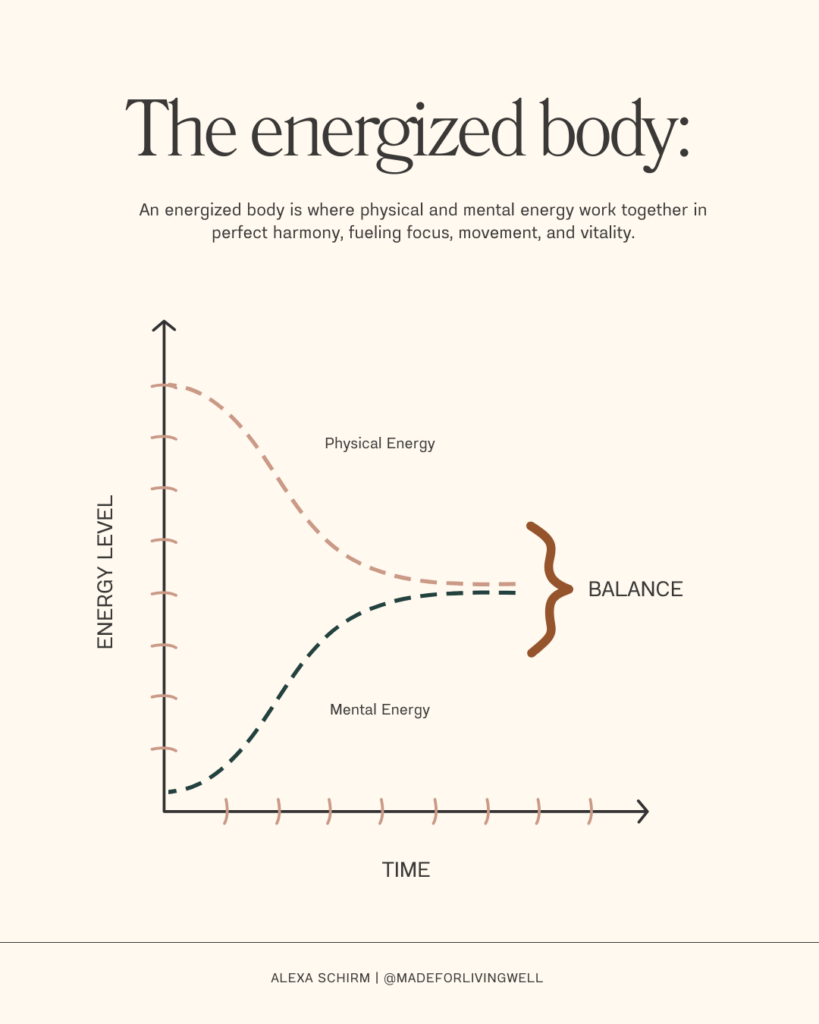
Listen on iTunes | Listen on Spotify | Listen on YouTube | Review the Podcast
We’re living in what many are calling a “rest era.” After decades of hustle culture and the relentless push to “be a boss,” it’s no surprise that we’ve swung in the opposite direction. Rest became a necessary cure for burnout. But as with all things, the pendulum can swing too far, leaving me to question: is your body bored?
The law of balance proves the pendulum will always swing in the opposite direction to the same degree you pulled it out of balance. Naturally, we’re going to see a big pull towards rest, considering how hard we pushed. Unfortunately, health, even life, doesn’t work based on extremes, but through the balance of both work and rest.
You need both work and rest to fully thrive.
Rest, while essential, isn’t meant to stand alone. It’s the balancing act to work. Without enough work, rest becomes stagnant, leaving us with a new kind of stress – a bored body.
Your body was designed to work. It thrives on movement, effort, and engagement. And while it might feel comforting to settle into rest after years of overexertion, this comfort can lead to imbalance. Life, after all, is about rhythm—an ebb and flow that mirrors the patterns found throughout nature and within our own bodies.
In this podcast, I discuss specifically how to determine if you’re living in extremes, creating a bored body, and how to change your body to promote health.
Spoiler: Your body was not meant to rest this much; doing so may mean it’s bored. And a bored body is not a healthy body.
The Science of Rhythm & Movement
Life isn’t a straight line. In fact, all of life is working based on a frequency or wavelength. Similar to an echocardiogram, a flatline signals death, not vitality. Life is found in the waves—the highs and lows, the push and pull.
This pattern shows up everywhere:
- Circadian rhythms regulate our sleep and energy cycles.
- Blood sugar levels naturally rise and fall throughout the day.
- Neurotransmitters fire in waves, creating mental focus and emotional balance.
Like the ocean, life is always in motion. In balance, this movement creates beauty and harmony. When stagnant, it breeds imbalance and toxicity. And when it becomes too extreme, it can lead to chaos and destruction.
Your body needs balance, and that comes from engaging in both work and rest. Your body is always in motion, which requires movement. Without movement (work), it can become bored, stagnant, and out of balance.
Is Your Body Bored?
A “bored body” is out of rhythm, leaning too far into rest without enough work. The imbalance causes an uncoupling to happen between mental energy and physical energy. When this imbalance occurs, like when your mental energy is depleted but your physical energy is high, it opens you up to a host of symptoms.

Surprisingly, fatigue is a terrible judge of your actual energy levels. Often, fatigue is linked to mental exhaustion without accounting for physical energy. That’s why, unlike healthy tiredness, fatigue is a sign of imbalance—a signal that your body needs movement, not more rest.
Other signs of a bored body might include:
- Inability to sleep or sleep well (may feel wired but tired)
- Insomnia
- Anxiety that, over time, leads to depression
- Physical discomfort, like stiffness or aches
- Feeling sluggish or unmotivated
- Poor GI health
- Low to no Libido
- Imbalanced hormones
- Intense cravings
- Increase drive for addictions or quick energy
- Brain fog or mental fatigue
If this sounds familiar, the solution isn’t complicated – it’s to cultivate balance.
How to Regain Balance
Health isn’t about rigid systems or extremes—it’s about tuning into your own needs and creating a rhythm that works for you. This might look like adding more movement to your day or more rest – the only person who knows is you. What you need will change, but you must pay attention to both your mental energy and physical energy to understand what you actually need.

Regardless, there is one clear need amongst humans, and that is movement. How we move and in what ways we move may vary, but the common denominator is that movement is needed nearly daily. It doesn’t have to be huge, and it shouldn’t drain you. Movement should energize you. Pay attention and start small.
- Start with five minutes of gentle movement, like walking.
- Try out different forms of exercise to find what feels good.
- Adjust the intensity based on your energy levels, whether it’s light stretching or strength training.
The key is experimentation. You’re the director of your health, free to evaluate, adjust, and find what works for your body. Nothing needs to be forever; find freedom in the flexibility.
Need motivation to get moving?
Do you need motivation to get moving? Join The Summer Walking Club, where knowledge meets movement.
This isn’t about punishing your body into submission. It’s about fueling it, expanding your capacity, and living out what health truly means.
Here’s what you’ll get:
- Daily tips to help you personalize your health journey.
- A rad t-shirt to rep your commitment.
- Opportunities to win prizes that keep you motivated.
- A fresh framework for health—less about rigid systems and more about what works for you.
And of course, walking—our most natural and effective form of medicine.
It’s time to dust off your sneakers, break out of the rest rut, and step into a rhythm of health and balance.
Join The Summer Walking Club Here
